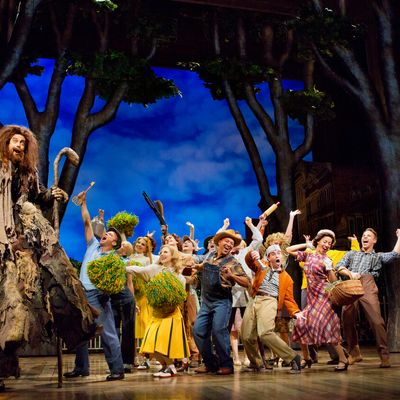
Big Fish, the new musical from composer Andrew Lippa (The Addams Family) and director Susan Stroman (The Producers), is a heartbreaker, though perhaps not the kind its creators were hoping for. Like the new kid whoÔÇÖs overshopped and overprepared for the first day of school, it wants desperately to be liked, and presents a desperate, sweaty simulacrum of likeability. And it gets a few important things very, very right. One thing in particular: Its main character, the aging southern fabulist Edward Bloom, is played with full-to-bursting heart by the vastly talented Norbert Leo Butz, one of the few Broadway triple-threats who can credibly slide from boyishness to old age in a split-second without triggering our gag reflex. IÔÇÖve never seen Butz deliver a dishonest or less-than-electric moment on stage, and Big Fish is no exception. But the show built around him is a pulseless bore, and you can see his shoulders sagging from carrying all that weight. Apart from a choice hook or two, the score is stillborn, the lyrics so inert theyÔÇÖre tautological. The whole show waits on the music to move it; the music stubbornly, Boehnerically refuses. ItÔÇÖs two and a half hours of near deadlock, and Butz helps us pass the time pleasantly enough. But even the biggest bass canÔÇÖt pull the boat home for you.
Big Fish, based on the book by Daniel Wallace, is a real life recounted in tall tales ÔÇö a┬ábull-dungsroman, if you will. When we meet him in old age, Edward Bloom is still charming everyone in his smile-radius with his wild stories ÔÇö part Greek myths, part Jack tales, part deep-fried redneck balderdash. (His life is an answer to the question, what if Forrest Gump hadnÔÇÖt been developmentally disabled at all, just a liar?) HeÔÇÖs been all over, that peripatetic Ed! (If we define ÔÇ£all overÔÇØ as ÔÇ£Alabama and its immediate neighbors.ÔÇØ) Oh, heÔÇÖs befriended giants! Worked for a wolfman once. Met a witch who showed him how heÔÇÖd die. (And gave him the source of his seemingly limitless confidence: He knows how heÔÇÖs gonna go, and, as he often repeats, ÔÇ£this isnÔÇÖt it.ÔÇØ) A great many of these exploits are touted in breathlessly compressed abstracts during the opening number, ÔÇ£Be the HeroÔÇØ (the showÔÇÖs snappiest production number, but also a harbinger of the lyrical literalism to come).
But EdÔÇÖs uberrational, ultra-urbane son Will (Bobby Steggert) only sees the absentee traveling salesman who skipped out on most of his childhood and left him with a stack of technicolor lies. (Yes, itÔÇÖs the cold-fish ungrateful-child role, a suicide mission: Steggert slogs through, but thereÔÇÖs not too much he can do.) Will knows all the stories, but he still doesnÔÇÖt know his father ÔÇö and now that heÔÇÖs married (to an endlessly patient expositioness played with sportsmanship and aplomb by Krystal Joy Brown) and expecting a child, heÔÇÖd like to correct that. Then some bad health news arrives for Edward, and WillÔÇÖs irk becomes an obsession: HeÔÇÖs convinced his fatherÔÇÖs hiding something behind his tattered Bulfinch of bull. Did the wonderful, legendary Edward Bloom cheat on his beloved wife Sandra (Kate Baldwin, statuesque and mostly confined to pedestal duty)?
Book writer John August guides us along with witty dialogue and committed characterizations, but ultimately heÔÇÖs at the mercy of LippaÔÇÖs score, which stops the show every time ÔÇö in the worst possible way. LippaÔÇÖs been a gifted crafter of melodies in the past (the tunes in┬áThe┬áWild Party┬áare wonderfully infectious), but his lyrics are liquid lead, with fruity notes of Hallmark. ÔÇ£IÔÇÖd live forever in this moment,ÔÇØ sings Edward, when he first lays eyes on Sandra, ÔÇ£if I could stop time.ÔÇØ Well, yes, of course you would. Not a single line of singing does much more than reheat a clich├® or restate a characterization or situation youÔÇÖve been familiar with for the last three scenes. For a life as uniquely monogrammed as Edward BloomÔÇÖs, a generic libretto feels like an insult.
Butz beams through all this styrofoam, and has help from Ryan AndesÔÇÖs Karl the Giant, a deft bit of stiltwork and basso profundo. He outshines even the strikingly tacky set, with its leprous LEDs and garish cartoon backdrops. The whole show feels held together with spit and blarney (you can see deep incisions where last-minute cuts and additions have been made), which might be charming if it all didnÔÇÖt look so damned expensive. But even ButzÔÇÖs expansive performance comes with a catch: As the fish gets bigger and bigger, the pond grows vanishingly small. Some lives donÔÇÖt live up to their stories, some stories donÔÇÖt live up to the lives theyÔÇÖre confabulating. Big Fish just kinda slowly settles to the bottom.
Big Fish is at the Neil Simon Theatre.

